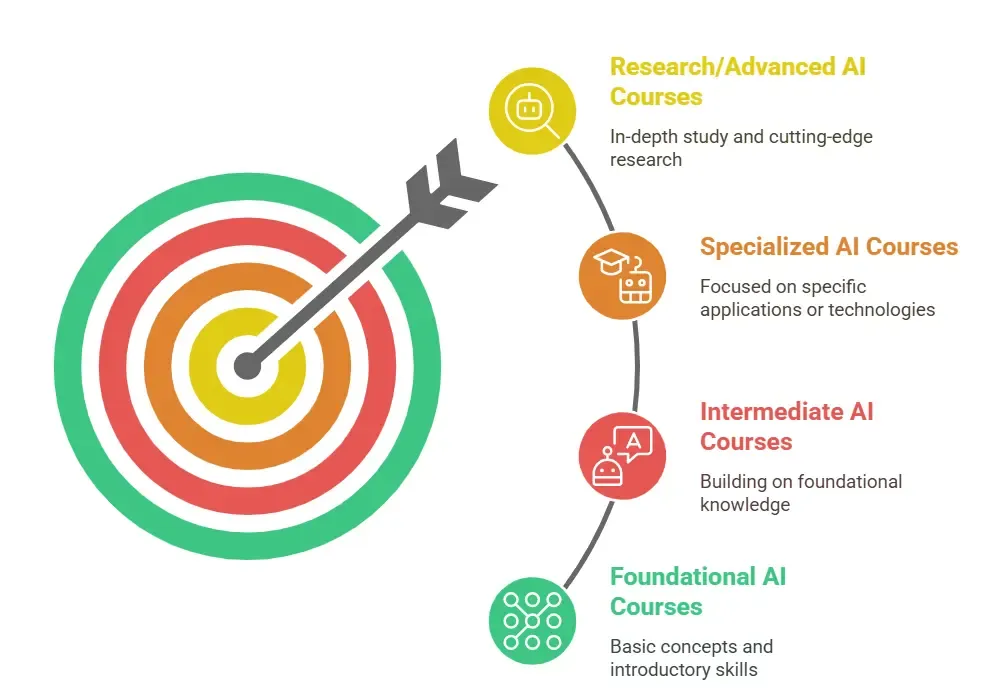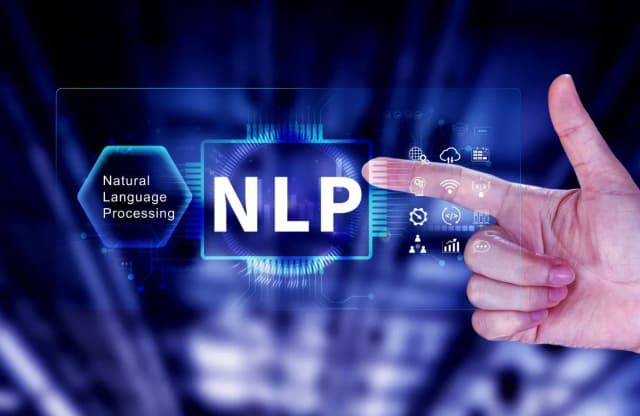How to Choose the Right AI Courses in 2025: An Expert Guide

AI is everywhere - from automating tasks to making life-changing breakthroughs in healthcare, finance, and cybersecurity. Businesses are integrating AI into their core operations, and those who fail to upskill risk becoming obsolete.
The Indian AI market is booming, projected to reach ₹2.48 trillion by 2030, with demand for AI professionals skyrocketing. Companies are hiring for new-age AI job roles like Prompt Engineers, AI Ethicists, and Machine Learning Architects. According to Glassdoor India, an entry-level AI engineer earns between ₹5-11.2 LPA, and salaries only increase with expertise.
With hundreds of AI courses flooding the market, choosing the right one can be overwhelming. Should you opt for a degree program, an intensive bootcamp, or an online certification? What should a good AI course include?
We'll help you find your way through the various AI and machine learning courses available in 2025, whether you're starting fresh or enhancing your existing skills.
Types of AI Courses: Foundational vs Specialized Learning Paths

AI courses come in different formats and cater to the learning needs of different learners. Here’s a breakdown of AI learning paths that you can choose from:
Foundational AI Courses
- Best For: Beginners or Career Switchers
- Objective: Build foundational AI understanding
- Includes:
- Introduction to AI & Machine Learning
- Basics of Python & Data Science
- Core AI concepts: Algorithms, Neural Networks, and AI Ethics
- Hands-on exercises with simple AI models
- Examples: Introductory AI courses, YouTube Tutorials, AI courses for non-technical professionals
Intermediate AI Courses
- Best For: Professionals with a basic understanding of AI looking to deepen their skills
- Objective: Develop practical AI expertise for real-world applications
- Includes:
- Machine Learning & Deep Learning models
- Natural Language Processing (NLP), Computer Vision
- AI tools: TensorFlow, PyTorch, OpenAI models
- Real-world projects
- Examples:
- Online AI Bootcamps
- AI certification programs for working professionals
- AI training programs
Specialized AI Courses
- Best For: For AI enthusiasts and domain experts
- Objective: Gain expertise in industry-specific AI applications
- Includes:
- NLP & Generative AI (Chatbots, LLMs like GPT)
- Computer Vision (Image Processing, Face Recognition)
- Reinforcement Learning (AI for gaming, robotics)
- AI for Healthcare, Finance, Cybersecurity, etc.
- Examples:
- AI in Finance (Algorithmic Trading, Fraud Detection)
- AI in Healthcare (Medical Image Analysis, Drug Discovery)
- AI for Business Leaders (AI Strategy & Implementation)
Research and Advanced AI Courses
- Best For: AI engineers and researchers
- Objective: Push AI boundaries through research & cutting-edge development
- Includes:
- AI Theory & Advanced Mathematics (Graph Theory, Quantum AI)
- Generative Adversarial Networks (GANs), Transformer Models
- AI Research in Robotics, AGI, Multimodal AI
- Contributions to AI research papers & open-source projects
- Examples:
- MS/PhD programs in AI & ML
- Research fellowships at AI labs (Google AI, OpenAI, DeepMind)
- University-led AI innovation programs
Key Components of Effective AI Courses
Quality AI courses pack several vital components that will give a student both theory and practical skills. Let’s have a look at what to consider before enrolling in a course:
Well-Laid-Out Curriculum
A good curriculum serves as the foundation of quality AI education. Top courses include modules on:
- Core AI Foundations
- Mathematics of AI (Linear Algebra, Probability, Statistics, Optimization)
- Programming Skills (Python, R, SQL, Bash Scripting)
- Data Structures and Algorithms (Graph Theory, Trees, Sorting, Searching)
- Machine Learning and Deep Learning
- Supervised and Unsupervised Learning (regression, classification, clustering)
- Neural Networks and Deep Learning (ANN, CNN, RNN, Transformers)
- Reinforcement Learning (Q-learning, Policy gradients)
- Optimization Techniques (Gradient Descent, Adam, RMSProp)
- AI Tools and Technologies
- Frameworks and Libraries (TensorFlow, PyTorch, Scikit-learn, OpenCV)
- Cloud AI Services (AWS SageMaker, Google Vertex AI, Azure ML)
- Big Data and AI Integration (Hadoop, Spark, Databricks)
- Specialized AI Domains
- Natural Language Processing (NLP) (LLMs, Chatbots, Sentiment Analysis)
- Computer Vision (Image Recognition, Object Detection, GANs)
- Generative AI (GPT, Stable Diffusion, MidJourney)
- Edge AI and IoT (Embedded AI, AI at the Edge)
This approach helps students progress from simple concepts to advanced applications.
Hands-On Experience
It sets great courses apart from average ones. Such courses allow students to apply AI techniques to ground scenarios through projects and case studies.
Programs like the IIIT Hyderabad AI and Machine Learning Course include capstone projects, where teams solve business problems using AI techniques.
Also, look for courses that offer you an opportunity to indulge in hackathons and AI research, which will help you build AI prototypes.
AI Ethics
Ethics is the lifeblood of quality AI education. The curriculum shall include:
- AI Bias & Fairness (Ethical AI principles, Diversity in AI)
- Explainable AI (XAI) (Interpretable models, Model accountability)
- AI Governance & Regulations
Other Factors to Consider Before Choosing the Right AI Course
Choosing an AI course goes beyond just looking at the curriculum. You need to think about several practical factors. The time you'll need to commit is one of the biggest things to review.
While considering the courses, your background plays a vital role. Most advanced courses need:
- A bachelor's degree in computer science, IT, statistics, or STEM fields
- Programming knowledge, especially Python
- Good grasp of mathematics, including linear algebra, calculus, and probability
Other factors you’d want to consider include:
Mode of Learning
When choosing an AI course, consider the mode of learning that best fits your schedule and learning style.
Online courses offer flexibility, making them ideal for working professionals, while full-time degree programs provide structured learning with in-depth mentorship.
Hybrid models combine online theory with in-person labs or workshops for hands-on experience.
For those looking for immersive, fast-paced learning, AI bootcamps offer intensive, real-world training in a short time. Choose a mode that aligns with your career goals and availability.
Faculty and Industry Experts
You cannot take the faculty for granted, as your learning would depend on the expertise of the faculty.
- Check faculty’s portfolios and their experience
- Look for their research work
- Explore if they have worked on any real-world AI applications
Regular Curriculum Updates
Go for the courses that mention frequent updates (e.g., yearly revisions). That’s the whole point: you don’t wish to get stuck with an outdated curriculum in a program.
Look for courses that align with industry standards, like updates on GPT-4/5, multimodal AI, and AI ethics regulations.
Collaboration with AI Companies
Prefer the courses that often host guest lectures or mentorship programs from AI leaders.
You can get insights from the AI leaders and professionals that can help you in your AI career.
Peer Reviews
Next, you need to check alumni feedback. Look for specific comments on:
- Curriculum rigor and practical application value
- Quality of mentorship and support systems
- Career outcomes and skill development
Certification Credibility
Check if the certification is recognized by major AI employers or if it aligns with AI education standards.
Cost and Duration
If we compare degree programs and certification, the cost of degree programs in India is around ₹ 2-7 lakhs, while the cost of a certification program ranges from ₹ 50,000 to ₹ 2 lakhs.
Additionally, the duration of degree programs can be around 2-5 years, while certification courses can be completed in a few months.
Career Support and Networking Opportunities
The main purpose of enrolling in a course is career advancement. So you cannot miss checking how the course will add value to your skills and help you grow in your career.
Additionally, check how the course providers help you with placement. Do they provide campus placement or other networking opportunities that can help in career support?
Choosing the right AI and ML course depends on factors like learning depth, time commitment, and career aspirations. Below is a comparison of two main AI course formats:
Course Type | Best For | Duration | Cost (India) | Pros | Cons |
| Degree Programs | Students, Researchers, AI Engineers | 2-5 years | ₹2-7 Lakhs | Strong foundation, Research opportunities, Networking | High cost, Time-consuming |
| AI Bootcamps and Certification | Career switchers, working professionals, Freshers | 3-12 months | ₹50,000-₹2 Lakhs | Intensive, Hands-on, Fast-track learning | High learning curve |
AI Specialization Tracks: Finding the Right Fit for Your Career
AI is vast and rapidly evolving; thus, one course cannot serve everything. Every course serves its purpose and is designed for specific learning paths. Choosing the right specialization can help you align your learning with your career goals - whether you're interested in data science, software development, research, or business applications.
Some of the most in-demand courses include:
Generative AI Courses
- Best For: Professionals and researchers focusing on AI content generation, LLMs, and creative AI applications
- Key Topics: Generative AI, Large Language Models (GPT-4/5, LLaMA), Prompt Engineering, Text-to-Image AI, AI Creativity
- Examples:
- Generative AI Course
- LLMs and NLP with Transformers Course
AI and Machine Learning Courses
- Best For: Aspiring data scientists, business analysts, and professionals looking to extract insights from data
- Key Topics: Machine Learning (ML), Deep Learning (DL), Big Data Analytics, Data Visualization, Predictive Analytics
- Examples:
- AI ML Certification Course
- AI Data Science Course
- Machine Learning Specialization
AI For Software Development and MLOPs
- Best For: Developers looking to integrate AI into applications and build scalable AI pipelines
- Key Topics: AI Model Deployment, MLOps, AI APIs, Cloud AI Services, CI/CD for AI
- Examples:
- AI and ML Operations Course
- AI-powered Software Development Course
AI For Business and Decision Making
- Best For: Business leaders, managers, and non-tech professionals looking to apply AI for strategic decision-making
- Key Topics: AI in Business, AI-Driven Automation, AI Strategy, AI Ethics in Enterprises
- Examples:
- AI for Business Leaders
- AI and Digital Transformation Courses
AI for Cybersecurity and Ethical AI
- Best For: Cybersecurity professionals and AI enthusiasts looking to enhance security systems with AI
- Key Topics: AI in Cyber Threat Detection, AI for Fraud Prevention, AI Bias & Fairness, AI Policy & Regulations
- Examples:
- AI in Cybersecurity
- AI Governance and Ethics
AI for Robotics and Autonomous Systems
- Best For: Engineers, researchers, and professionals working in robotics, autonomous vehicles, and industrial automation
- Key Topics: Reinforcement Learning, Computer Vision for Robotics, AI in Autonomous Vehicles, Edge AI, Sensor Fusion
- Examples:
- AI for Robotics
- AI and Autonomous System Course
- Industrial AI and Automation
AI for Finance and FinTech
- Best For: Finance professionals, quantitative analysts, and anyone looking to integrate AI into banking, trading, and risk analysis
- Key Topics: AI in Trading, Algorithmic Trading, Risk Prediction, Fraud Detection, AI in Credit Scoring
- Examples:
- AI in Finance
- Algorithm Trading with AI
- AI in FinTech
AI in Healthcare
- Best For: Healthcare professionals, biomedical researchers, and AI developers interested in medical AI applications
- Key Topics: AI in Medical Imaging, AI for Drug Discovery, AI in Disease Prediction
- Examples:
- AI in Healthcare
- Bioinformatics and AI
Key Takeaways
Students need to think over multiple factors when picking an AI and machine learning course.
Here’s a quick checklist for you to consider before enrolling in the course!
- Course content and structure
- Covers AI fundamentals
- AI ethics
- Includes capstone projects
- Up-to-date curriculum
- Mode of learning
- Faculty Experience and Industry Experts
- Certificate Recognition
- Cost and Duration
- Career Support and Networking
Want to begin your journey into AI? The AI ML Bootcamp at TalentSprint could be right for you. It lines up with what we discussed and gives you a good mix of theory and hands-on training.
Your success in AI depends on finding a program that matches your goals. Research well, check the credentials, and pick a course that fits your career path. It's worth mentioning that AI's future looks promising, and the right education can help you become part of this exciting field.

TalentSprint
TalentSprint is a leading deep-tech education company. It partners with esteemed academic institutions and global corporations to offer advanced learning programs in deep-tech, management, and emerging technologies. Known for its high-impact programs co-created with think tanks and experts, TalentSprint blends academic expertise with practical industry experience.



